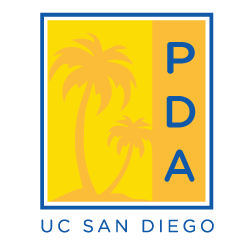
James Gregory, Ph.D.
Staff Scientist, Center for the Genomics of Neurodegenerative Disease | The New York Genome Center

- Interview Overview
Interview Overview
Interviews and Editing by: Alexandra Bortnick
Interview: October 2015
Transition: July 2015
1. Please list your previous department at UC San Diego and provide a brief description of the research you conducted?
I was in the Division of Biological Sciences in Kit Pogliano’s laboratory as a graduate student where I investigated the temporal and spatial regulation of cell division in Bacillus subtilis. After completing my PhD, I conducted my postdoctoral studies with Stephen Mayfield because I was interested in algal biotechnology. There I developed green algae as a platform for producing inexpensive vaccines and therapeutics focusing specifically on malaria transmission blocking vaccines.
2. Please describe your current job profile?
My responsibilities change as the needs of the group evolve. We primarily study ALS and I am investigating the contribution of a hexanucleotde repeat expansion of chromosome 9 open reading frame 72 (C9orf72). C9orf72 was discovered a few years ago and is the most common cause of familial ALS. I am also developing methods to look more generally at disease associated repetitive regions of DNA.
3. What made you decide to transition into your current position?
I was on the conventional academic career path. I did a second postdoc at the Mount Sinai School of Medicine in New York City, which ultimately led to a non-tenure track faculty position. I split time evenly between writing grants and bench work. While I enjoyed many aspects of my job, I found it to be quite isolated and frustrating, so I began pursing other options.
4. Apart from the research you conducted, do you feel like anything in particular has helped you acquire your current position?
Learning how to effectively communicate your ideas and your research to a broad range of audiences is essential for transitioning from a postdoc position. Any future job will require that you can communicate your ideas both verbally and in writing. I spent a great deal of time teaching, training undergraduate students, and writing during my postdoc. I also gave seminars to lay audiences, scientists, and donors at various conferences and events.
5. Please list some of the most striking similarities and differences between your postdoc and current position?
We are remarkably similar to a typical academic lab except that we pursue research goals as a group. We are composed of a director, staff scientists with postdoctoral or industry experience, a lab manager, and technicians. Unlike a traditional academic lab, the pressure to churn out first author publications is greatly diminished so the environment has a much different feel to it. My current position allows me to spend more of my time doing what I enjoy – undertaking challenging and exciting experimental work that is much more collaborative in nature. It also offers me a great deal of flexibility in the projects that I lead. As a group, we are developing new protocols and generating comprehensive data sets that will be useful to the academic community.
6. Is there any specific challenge (during the entire process of transitioning) that you would like to highlight and, if so, how did you overcome it?
Limiting your job search to posted job positions will be frustrating (even for traditional academic professor positions), and most of the time you won’t get a response after submitting a resume. You’re much better off using your existing network to expand your job search. Find people in a field that interests you and ask how they got there. Ask them who else would be good to talk to about that career choice and ask for their advice. Doing this iteratively will expand your network exponentially. Some of your meetings/phone calls will be unproductive, but some will be very informative and lead you in directions you did not expect. For me, this ultimately led to meeting someone at the New York Genome Center after about six months of searching. I had several more meetings there before they invited me for a formal interview.
7. Please describe your goals and ambitions for the next 5 years?
My goal is to be at the cutting edge of technology development and data analysis in genomics research. This includes methodologies in molecular biology, biochemistry, and computational biology as it relates to genomics research. We are generating genomic data faster that we can analyze it. This phenomenon will increase with time as genomic data become richer, including single cell analysis, allele biased expression, epigenetic data, chromatin structure, etc.
8. What do you feel you could have done more, as a postdoc, to help prepare you for or acquire your current position?
Take advantage of collaborations. Your time is very limited and often the knowledge and expertise you need isn’t very far away. Don’t be afraid to seek help outside of your lab and entice them to work with you if the project is mutually beneficial. Pick your collaborators carefully though, because it can be frustrating if they are not as motivated to work on the project as you are.
9. What do you feel is the most important advice you can give to a current UCSD postdoc in order for them to obtain a position such as yours?
Postdoctoral training is just that, training. Have a goal in mind. A postdoc can last a very long time if you don’t keep your head above the details of your specific projects, so know what you want to accomplish. It’s never too early to be preparing yourself for the next step. Meet new people, get advice, repeat. This will make your job search so much easier when you’re ready to make the transition. If you are pursuing a professor position, be sure to meet visiting speakers and engage them as much as possible. These connections can help you find departments looking to hire junior investigators later on.
